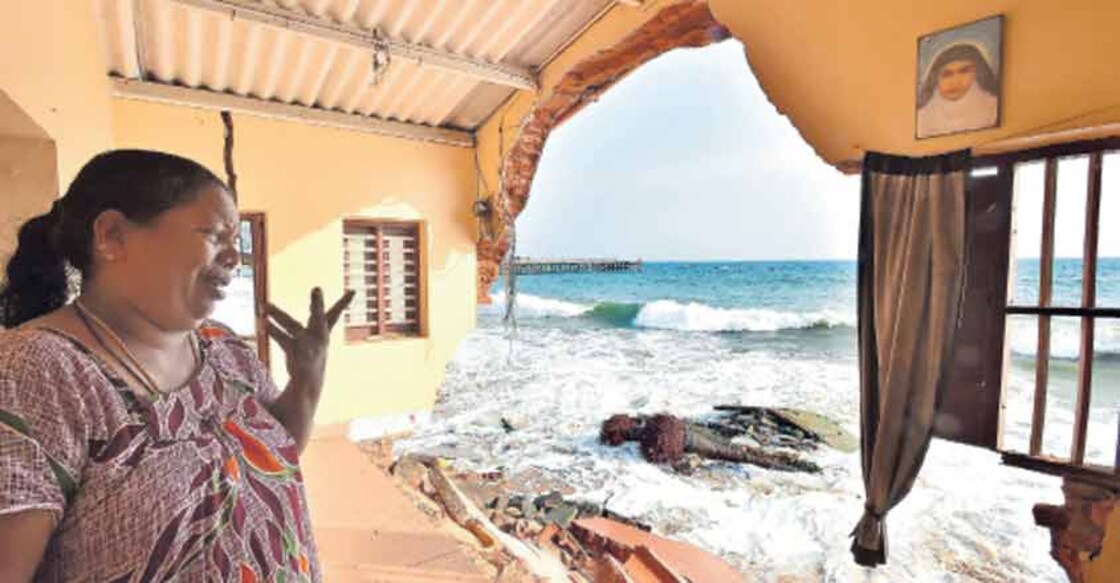Pain and revelry as doom gets closer at Valiyathura coast

Mail This Article
There was something exceptionally bizarre yet so immensely profound about the sights along the sea-battered Valiyathura coast on Thursday. It almost seemed straight out of a strange neo-realist film.
A row of concrete houses, walls and foundations blown away by dreadful waves, dangles over the edge of the coast. These structures were so delicately balanced that it looked as if a slight breeze was enough to topple the entire houses face down into the agitated sea below. The men who consumed the last savings of their toil to construct these cosy little tile-paved houses could do nothing except look out into the sea and sob.
But in the row of houses just an arm's length behind the ravaged ones, in the houses next in line to take the beating of the sea, the mood almost mocks the tragedy unfolding right in front of them. In the narrow space between the rows of houses, children play some kind of a board game, youths fiddle with mobiles, women hang washed clothes on the line and men have a whale of a time playing cards. There was laughter and shouting.
It was as if all the destruction that had taken place right before them on April 24 had occurred in some unknown faraway land. It was as if the warning of high waves that can rise up to 2.5 metres on that very day (April 25) were not meant for them. (A depression off the Indian Ocean, the fishermen have been warned, is threatening to gather into a hurricane by April 28.)

“We want to remain happy as long as it lasts,” said David, a fisherman who was playing cards with friends in the row just behind the shattered one. “Once the sea closes in, which it soon will, we will be put in some camps where no fun or games are possible,” he said. Now, the fun and laughter felt like life's last hurrah before the doom sets in.
However, there was one person who looked seriously worried. Alexander. He was not a fisherman. He was the only poultry farmer in Valiyathura. “I have four cows, eight goats and two dogs to look after. The others can pack their bags and go to a camp but what am I to do with these four-legged creatures,” Alexander said, tending to his cows. He is so close to the sea that the salty wave showers that scatter when furious waves crash on the rocks at the edge of the shore fall abundantly on Alexander and his cows.
His son, however, seemed least bothered. Inside the house, his son is seen surfing his mobile casually lying on a sofa unperturbed by the mighty roar of the sea just a long-jump distance behind him. Just a step in front of Alexander's house is Solomon's half-wrecked two-storey house. The waves had blown away the wall of the house that faced the sea.

“This happened yesterday night,” said Solomon. “I was on the top floor packing things up to leave when we heard a huge sound. I came down to see the wall gone,” he said. Now with the front wall removed, Solomon's hall-cum-dining is like a stage that offers a breathtaking view of a vast troubled blue expanse. On the side walls of the broken house, untouched by the monster waves, are framed pictures of Jesus Christ and the disciples.
According to Solomon, there were five rows of houses ahead of his just three years ago. “Two rows before us were taken away last May,” Solomon said. “Now, our row too will be taken away, leaving no proof that my house had once existed,” Solomon said.
The administration is trying to pack sandbags in front of the first row of houses to resist the sudden fury of the waves. “It will be of no use,” said Simson, whose house is the first in the row from the Valiyathura end. “I had spent Rs 30,000 a few months ago to place sandbags in front of my house. Now see how they have helped,” he said, taking us into his house, which too like Solomon's is a small two-storeyed one.
The house is strikingly violent in colour and, like others along the row, it too tilts dangerously over the sea. The two rooms that face the sea, and its foundation, have been swept away. “But I still live inside this house,” Simson said. “I have sent my wife to live with her brother in Tamil Nadu. I am better off here than in any camps,” he said. Solomon and his wife Lajithal, a kidney and heart patient, are in one of the many camps that had been opened to accommodate coastal folk who had lost their houses.
It is not without reason why coastal folk like Simson have an aversion to camps. Twelve families - over fifty men, women and children - have been put in an anganwadi in Valiyathura. “We have just a single bathroom and there is no water,” a woman in the camp said. Right outside the camp is an e-toilet trailer, nearly as big as a train compartment. But that is dysfunctional.
“You people speak a lot about how fishermen rescued people during the August 2018 floods. If what you say is genuine, at least provide us with a decent toilet,” the woman in the camp said.


